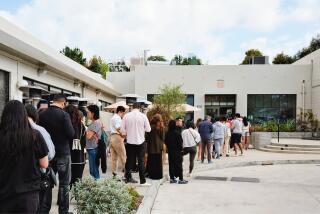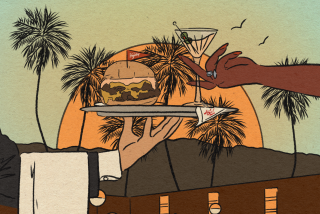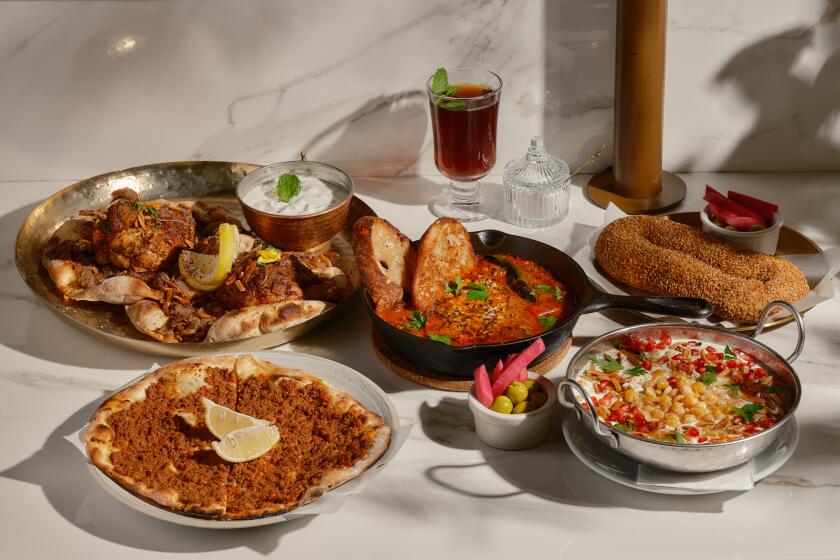Pizza Maker Adds a Dash of Audacity
Just ask him. Ron Gelet thinks Numero Uno has “the number-one best” pizza in Southern California.
It’s the kind of boast one would expect from the founder of a pizza chain. But Gelet makes braggadocio the trademark of his Woodland Hills-based pizza chain, the biggest one headquartered in the Los Angeles area.
For starters, consider the name, Numero Uno. Gelet, who claims credit for bringing hearty deep-dish pizza from Chicago to the Southland, also coined the motto, “One Bite and We Gotcha.”
And in Numero Uno’s most recent advertising campaign, actor Joe Santos, who played police Lt. Dennis Becker on “The Rockford Files,” promises: “You Don’t Love It, You Don’t Pay.” (Gelet says 50 customers took him up on the offer during the five-month ad campaign.)
With 60 restaurants, Numero Uno is dwarfed nationally by chains like Pizza Hut, with 5,200 outlets, and Domino’s Pizza, with 3,950. But, relying largely on the sheer force of Gelet’s personality, Numero Uno says it has an estimated 14% of the pizza business in Southern California and is thriving despite the competition.
Gelet, a solidly built 43-year-old who grew up in a working-class neighborhood in Chicago, spends only one day a week in the office. Most any other day, he is in the restaurants, making pizzas, checking the sauces, tasting the salad dressings or asking the customers what they think about Numero Uno.
Gelet, the chairman and chief executive, is especially fussy about the dough. To make sure the pizzas taste the same in El Toro as in Thousand Oaks, the chain has a food products company make all of the dough used at its outlets, all but one of which are in Southern California.
“People either love it or hate it, but Numero Uno is known for its dough,” said Richard Martin, West Coast editor for Nation’s Restaurant News. Martin and others describe the crusts as “sweetish.”
Dough by Computer
For the sake of consistency, the proportions of flour and other ingredients are mixed by computer-controlled equipment. To keep the recipe a secret, only Gelet and his wife, Karen, control the computer software.
“Anybody can put vegetables, sauce and cheese on a pizza,” Gelet said, adding that controlling humidity and temperature for pizza dough can be “a science.”
Other pizza chains, such as Pizza Hut, have each of their restaurants make their own dough using prepared mixes. “We make dough twice a day to keep it as fresh as possible,” said Michael J. Jenkins, a Pizza Hut spokesman.
Gelet says he makes most of Numero Uno’s operational decisions, such as how to prepare the food. Financial matters are left mainly to Howard A. Davis, 31, who joined Numero Uno eight years ago as an accountant after answering a newspaper classified ad. He now is the president.
“I’m a bad businessman,” Gelet said. “I’d rather be making pizzas.”
$25 Million in Sales
Numero Uno’s sales for its fiscal year ended Jan. 31 topped $25 million, up nearly 218% since 1980. Average sales per restaurant reached $477,602 last year, up 66% since 1978.
Gelet attributes the increase in sales per restaurant partly to lunch specials and discount coupons. But he says he wants to move away from such price cutting, and sell people more on the food itself.
Meanwhile, Numero Uno is benefiting from a surge in pizza’s popularity. Pizza chains are growing faster than any other type of restaurant chain, according to Nation’s Restaurant News. It reported that pizza sales rose 22.7% nationally over the past year to $5.4 billion.
Forty-nine of the Numero Uno restaurants are franchises, and 11 are company-owned. Each has about 20 employees. As owners of the parent company, the Gelets collect 7% of the franchisees’ gross sales as royalties. Another 3% goes to an advertising fund.
Numero Uno had humble beginnings. A lifelong pizza fan, Gelet got the idea of getting into the business in 1972 after a pharmaceutical firm transferred him to California from Milwaukee, and he couldn’t find any thick-crusted Midwest-style pizza.
The Gelets developed recipes in their kitchen, based on the deep-dish style popular in Chicago. He says the secret dough recipe was “discovered accidentally” when what is now a key ingredient was spilled into a mix.
Started in Northridge
Gelet then was ready to quit his job and start his own pizza business, but the only financing he could raise was a $20,000 bank loan. To cut expenses, he and some friends dug a trench themselves for the foundation of a restaurant building near the intersection of Reseda Boulevard and Plummer Street, a block west of the California State University, Northridge campus.
Although Gelet says business at that outlet wasn’t bad, it was closed after the landlord refused to renew the lease. Still, the Gelets soon had three restaurants in operation and began trying to set up franchises. By 1981, Los Angeles magazine was calling Numero Uno’s pizza the best offered at any local chain.
Focuses on New Dishes
Eventually, Gelet said, the chain would like to consider expanding beyond Southern California. Meanwhile, it is focusing on boosting sales by offering new dishes.
Dishes other than pizza now account for only about 30% of the chain’s food sales, and Gelet would like to boost that share to 50%. To that end, the chain recently introduced such “gourmet” dinners as Cajun-style shrimp, tortellini with white sauce, linguine with clams and fettuccine primavera.
Although some of Numero Uno’s moves are giving it a tonier style, Gelet scoffs at the wave of restaurants starting to serve gourmet pizzas made with such exotic ingredients as sun-dried tomatoes, smoked duck sausage, or even salmon and caviar. Crusts come in various forms.
“These nouvelle pizzas aren’t pizzas,” he said. “They have cracker-crumb crusts, no sauce. They have nothing to do with pizza.”
More to Read
Eat your way across L.A.
Get our weekly Tasting Notes newsletter for reviews, news and more.
You may occasionally receive promotional content from the Los Angeles Times.






